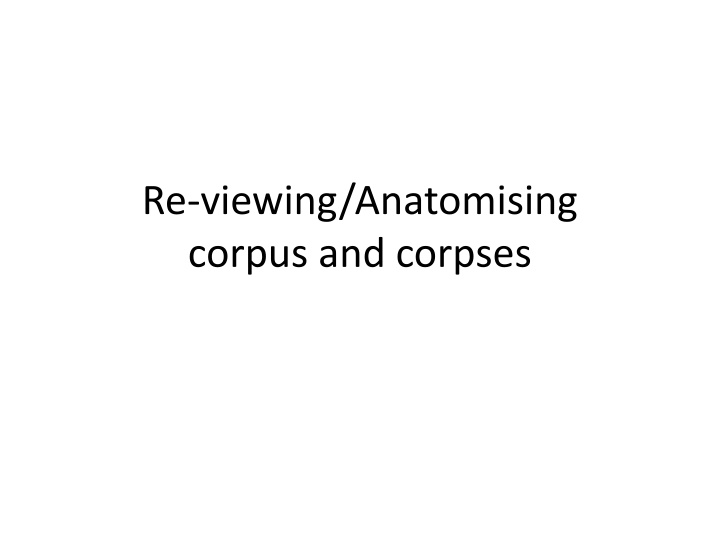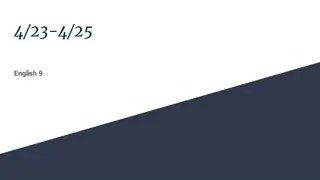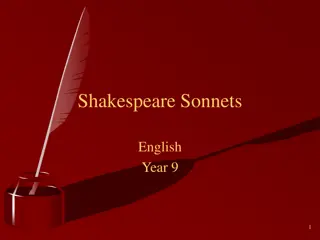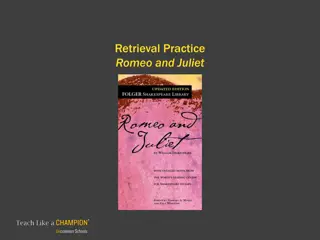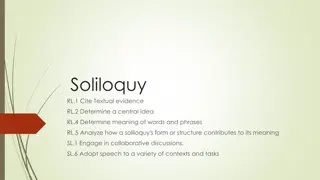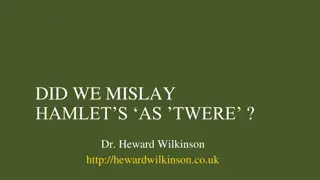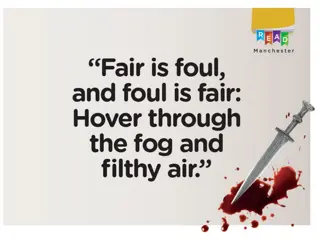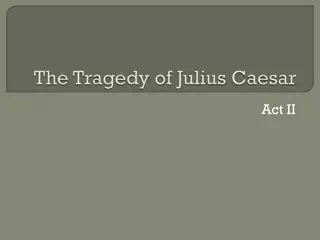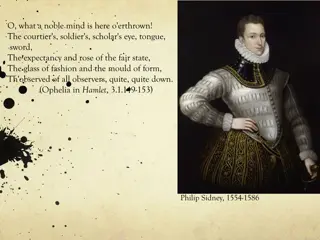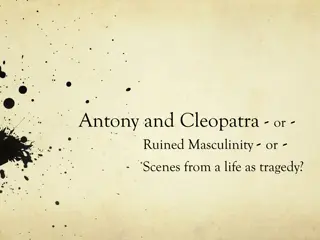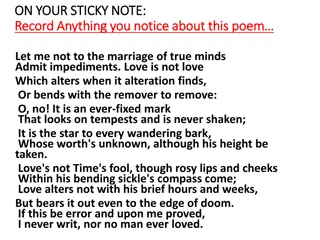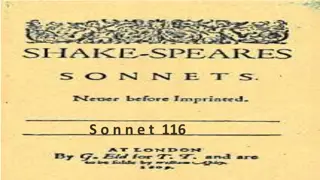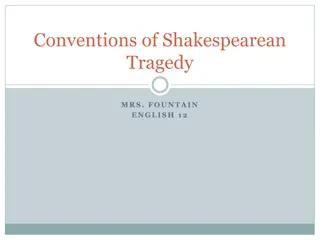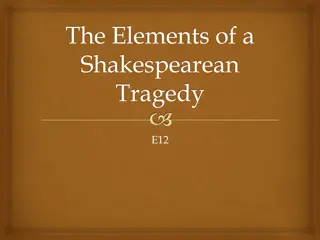Reflections on Body and Identity Through Shakespearean Texts
Delve into the themes of body consciousness, identity, and mortality through excerpts from Shakespearean plays like Richard III and Hamlet. The text explores the nuances of physical appearance, inner turmoil, and societal perceptions, offering a profound reflection on the human experience.
Download Presentation

Please find below an Image/Link to download the presentation.
The content on the website is provided AS IS for your information and personal use only. It may not be sold, licensed, or shared on other websites without obtaining consent from the author.If you encounter any issues during the download, it is possible that the publisher has removed the file from their server.
You are allowed to download the files provided on this website for personal or commercial use, subject to the condition that they are used lawfully. All files are the property of their respective owners.
The content on the website is provided AS IS for your information and personal use only. It may not be sold, licensed, or shared on other websites without obtaining consent from the author.
E N D
Presentation Transcript
Re-viewing/Anatomising corpus and corpses
I am not shaped for sportive tricks / rudely stamped curtailed of this fair proportion,/ Cheated of feature .../ Deformed, unfinished, sent before my time / Into this breathing world scarce half made up ; elvish-marked, abortive rooting hog rag of honour bottled spider poisonous bunch-backed toad (Richard on Richard; Margaret on Richard, Richard III)
Body Consciousness The ideal body The iconic body The physical body The performative body
Sleeping within my orchard, My custom always in the afternoon, Upon my secure hour thy uncle stole With juice of cursed hebenon in a vial, And in the porches of mine ears did pour The leperous distilment, whose effect Holds such an enmity with blood of man That swift as quicksilver it courses through The natural gates and alleys of the body, And with a sudden vigour it doth posset And curd, like eager droppings into milk, The thin and wholesome blood. So did it mine; And a most instant tetter barked about, Most lazar-like with vile and loathsome crust, All my smooth body. (Hamlet, 1.5.59-73)
Thus was I, sleeping, by a brothers hand Of life, of crown, of queen at once dispatched, Cut off even in the blossoms of my sin, Unhouseled, dis-appointed, unaneled, No reck ning made, but sent to my account With all my imperfections on my head. O horrible, O horrible, most horrible! (Hamlet, 1.5.74-80)
Hal: These lies are like their father that begets them gross as a mountain, open palpable. Why, thou clay-brained guts, thou knotty-pated fool, thou whoreson obscene greasy tallow-catch This sanguine coward, this bed-presser, this horse-back- breaker, this huge hill of flesh Falstaff: Sblood, you starveling, you elf-skin, you dried neat s tongue, you bull s pizzle, you stock-fish O, for breath to utter what is like thee! you tailor s yard, you sheath, you bowcase, you vile standing tuck (1Henry IV, 2.5.208-11,223-29)
Lucius: Ah, that this sight should make so deep a wound And yet detested life not shrink thereat That ever death should let life bear his name Where life hath no more interest but to breathe! [Lavinia kisses Titus] Marcus: Alas, poor heart, that kiss is comfortless As frozen water to a starved snake. Titus: When will this fearful slumber have an end? Marcus: Now farewell flatt ry. Die, Andronicus. Thou dost not slumber. See thy two sons heads, Thy warlike hand, thy mangled daughter here, Thy other banished son with this dear sight Struck pale and bloodless, and thy brother, I, Even like a stony image, cold and numb. Ah, now no more will I control thy griefs. Rend off thy silver hair, thy other hand Gnawing with thy teeth, and be this dismal sight The closing up of our most wretched eyes. Now is the time to storm. Why art thou still? Titus: Ha, ha, ha. (Titus Andronicus, 3.1.245-263)
[accusation: bewitched the bosom stoln the impression of her fantasy filched my daughter s heart ] Theseus: What say you, Hermia? Be advised, fair maid: To you your father should be as a god, One that composed your beauties, yea, and one To whom you are but as a form in wax, By him imprinted, and within his power To leave the figure or disfigure it. A Midsummer Night s Dream 1.1.46-51
Lord: Sirrah, go you to Bartholmew my page And see him dressed in all suits like a lady. That done, conduct him to the drunkard s chamber And call him madam , do him obeisance. Tell him from me, as he will win my love, He bear himself with honourable action Such as he hath observed in noble ladies Unto their lords by them accomplished. Such duty to the drunkard let him do With soft low tongue and lowly courtesy, And say What is t your honour will command Wherein your lady and your humble wife May show her duty and make known her love? I know the boy will well usurp the grace, Voice, gait, and action of a gentlewoman. (The Taming of the Shrew, Induction 2, 101-128)
[Ulysses: May I, sweet lady, beg a kiss of you? Cressida: You may. Ulysses: I do desire it. Cressida: Why, beg too. Ulysses: Why then, for Venus s sake, give me a kiss / When Helen is a maid again, and his Cressida: I am your debtor; claim it when tis due. Ulysses: Never s my day, and then a kiss of you. Diomedes: Lady, a word. I ll bring you to your father.] Nestor: A woman of quick sense. Ulysses: There s language in her eye, her cheek, her lip, Nay, her foot speaks. Her wanton spirits look out At every joint and motive of her body. O, these encounterers so glib of tongue, That give accosting welcome ere it comes, And wide unclasp the tables of their thoughts To every ticklish reader, set them down For sluttish spoils of opportunity And daughters of the game. Fie, fie upon her! Troilus and Cressida 4.6.48-64
Achilles: Thou! Now Hector, I have fed mine eyes on thee. I have with exact view perused thee, Hector, And quoted joint by joint. Hector: Is this Achilles? Achilles: I am Achilles. Hector: Stand fair, I pray thee, let me look on thee. Achilles: Behold thy fill. Hector: Achilles: Thou art too brief. I will the second time As I would buy thee, view thee limb by limb. Hector: O, like a book of sport thou ltread me o er. But there s more in me than thou understand st. Why dost thou so oppress me with thine eye? Achilles: Tell me, you heavens, in which part of his body Shall I destroy him whether there, or there, or there That I may give the local wound a name, And make distinct the very breach whereout Hector s great spirit flew? Nay, I have done already.
Her eye must be fed The object poisons sight
CRESSIDA Here, Diomed, keep this sleeve. TROILUS O beauty! where is thy faith? ULYSSES My lord, TROILUS I will be patient; outwardly I will. CRESSIDA You look upon that sleeve; behold it well. He loved me O false wench! Give't me again. DIOMEDES Whose was't? CRESSIDA It is no matter, now I have't again. I will not meet with you to-morrow night: I prithee, Diomed, visit me no more. THERSITES Now she sharpens: well said, whetstone! DIOMEDES I shall have it. CRESSIDA What, this? DIOMEDES Ay, that. CRESSIDA O, all you gods! O pretty, pretty pledge! Thy master now lies thinking in his bed Of thee and me, and sighs, and takes my glove, And gives memorial dainty kisses to it, As I kiss thee. Nay, do not snatch it from me; He that takes that doth take my heart withal. DIOMEDES I had your heart before, this follows it. TROILUS I did swear patience. CRESSIDA You shall not have it, Diomed; faith, you shall not; I'll give you something else. DIOMEDES I will have this: whose was it? CRESSIDA It is no matter. DIOMEDES Come, tell me whose it was. CRESSIDA 'Twas one's that loved me better than you will. But, now you have it, take it.
CRESSIDA Good night: I prithee, come. [Exit DIOMEDES] Troilus, farewell! one eye yet looks on thee But with my heart the other eye doth see. Ah, poor our sex! this fault in us I find, The error of our eye directs our mind: What error leads must err; O, then conclude Minds sway'd by eyes are full of turpitude. [Exit] THERSITES A proof of strength she could not publish more, Unless she said ' My mind is now turn'd whore.'
Troilus: Cressida: Sir, mine own company. Troilus: You cannot shun yourself. Cressida: I have a kind of self resides with you But an unkind self, that itself will leave To be another s fool. Where is my wit? I would be gone. I speak I know not what. (Troilus and Cressida, 3.2.131-38) What offends you, lady? Let me go and try.
